Political novice and comedian Volodymyr Zelensky won a sweeping victory [HT: Foreign Policy] in Ukraine’s elections what is seen as a protest vote against Ukraine’s establishment. He beat out incumbent President Petro Poroshenko with over 70 percent of the vote, running on a platform of rooting out the country’s endemic corruption.
“The absolute majority of Ukrainians again, just as they did five years ago, want radical political change. In that sense, this was a kind of Maidan — but an electoral one,” Ukrainian political analyst Volodymyr Fesenko told RFE/RL, referring to the central Kyiv square at the heart of the 2013-14 protests that helped oust Russia-friendly President Viktor Yanukovych and paved the way for Poroshenko’s election.
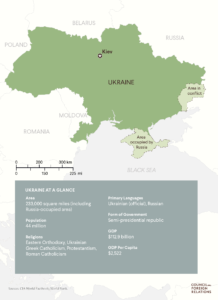
Credit: CFR
Five years after its revolution, Ukraine has seen competitive elections unseat a sitting president in a peaceful transition of power—a rarity in the post-Soviet region and a genuinely impressive achievement, The Economist adds:
Despite widespread fears about challenges to the legitimacy of the vote, election day passed off smoothly. An emboldened civil society and free press helped hold politicians to account…..In his first remarks after exit polls became public, Mr Zelensky nodded to this reality, and the example it may set: “To all the countries of the former Soviet Union: look at us, everything is possible.”
Election observers from the Organization for Security and Cooperation in Europe praised Ukraine for conducting a presidential election that sets the stage for a “democratic and orderly transfer of power,” AP adds. The OSCE election monitoring mission said in a statement issued on Monday that the country’s runoff election on Sunday was “competitive and held with respect for fundamental freedoms.”
“Forget the claims that he’s a clown and knows nothing,” said Melinda Haring, editor of the Atlantic Council’s UkraineAlert blog. “He likely won’t be able to do much in the next six months because every political party is positioning itself for the October parliamentary elections and will want to prevent Zelensky and his party from any real legislative success.”
“Expect gridlock and massive fighting in the Ukrainian parliament in the next sixth months if the governing coalition holds,” former NED Penn Kemble fellow Haring told CNN.
Even the best-informed experts are unsure of Zelenskiy’s position on the four fundamentals: Ukraine’s state sovereignty, national identity, economic viability, and social cohesion, Ghent University’s Olga Burlyuk writes for the Carnegie Endowment:
The next few days and weeks will be telling and eventful. One may fear that the pessimist voices are proven right, one may pray that they are proven wrong. Either way, it will be up to Ukraine’s civil society to stick together, contain the authorities and work tirelessly for incremental change, “not thanks to, but despite” those in power, as a Ukrainian saying goes.

Tech 4 Dem
Mr. Zelensky’s triumph hits back at years of Russian propaganda presenting Ukraine as a failed state dominated by fascists steeped in anti-Semitism and contempt for Soviet fighters who defeated Hitler’s forces in World War II, The New York Times reports:
Though part of a trend that has brought the rise of maverick political outsiders in the United States and Europe in recent years, Mr. Zelensky has shunned populist themes like hostility toward immigrants and minorities. Ukrainians worry less about outsiders coming in, and more about the large number of their own people leaving to work in Poland and other wealthier countries.
Zelenskiy will also have to demonstrate his ability to negotiate with various political forces to push through much-needed reforms. He does not have a proper political party of his own and will likely face huge resistance in parliament, where Poroshenko’s faction has the most seats, AFP adds.
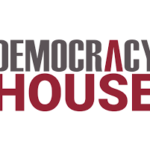 “It would be very hard for Zelenskiy to secure parliament’s support,” said Anatoliy Oktysyuk, an analyst with Kiev-based think tank Democracy House. “He will have a hostile parliament on his hands.”
“It would be very hard for Zelenskiy to secure parliament’s support,” said Anatoliy Oktysyuk, an analyst with Kiev-based think tank Democracy House. “He will have a hostile parliament on his hands.”
Zelenskiy is widely expected to maintain Ukraine’s generally pro-Western orientation in foreign policy but the question marks about his links to [billionaire Ihor] Kolomoiskiy, and his commitment to break with oligarch power, are likely to linger, POLITICO reports.
“I am not that concerned by Russia’s influence — the risk from Kolomoisky is larger,” said Timothy Ash, a Ukraine expert and London-based economist with BlueBay Asset Management. “No Ukrainian politician can be pro-Russian and stay in office or win office.”
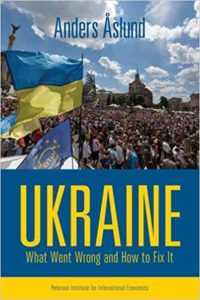 Still, Anders Aslund from the U.S.-based think tank the Atlantic Council said that because “everybody will keep their eyes on anything that looks like Kolomoisky influence,” it would be Zelenskiy’s “political death” if he offered Kolomoisky anything.
Still, Anders Aslund from the U.S.-based think tank the Atlantic Council said that because “everybody will keep their eyes on anything that looks like Kolomoisky influence,” it would be Zelenskiy’s “political death” if he offered Kolomoisky anything.
“The beauty of this election is that we did not know when it started who was going to win,” said David J. Kramer, a Russia expert who was an assistant secretary of state under President George W. Bush. “It is not a preordained exercise,” he told the Times. As of Sunday afternoon, polling had been calm and free of notable irregularities, said Mr. Kramer, who is in Ukraine with a team of election observers from the International Republican Institute, an independent group.
“It is a testament to the vibrancy of Ukraine’s democracy to have its two presidential candidates appear in-person to debate and make their case to voters,” said Kramer, co-leader of IRI’s election observation delegation. “The event is significant in a region where such debates do not happen often enough, including Russia.”
Zelenskiy is Jewish, and he speaks better Russian than Ukrainian, which means most voters have proved unsusceptible to hardcore Ukrainian nationalism, which is traditionally anti-Semitic and intolerant to all things Russian, adds Leonid Bershidsky. Zelenskiy is only 41, and he’s not a member of the post-Soviet political elite, a notoriously corrupt and self-serving bunch, and he’s a self-made millionaire with a successful production company, he writes for The Moscow Times:
Poroshenko and other Ukrainian politicians are making plans for the October parliamentary election (or an early one if Zelenskiy can find a legal way to dissolve the parliament so close to the end of its term), hoping to prevent Zelenskiy’s start-up party (called Servant of the People, of course) from gaining a majority. But if they do well and Zelenskiy is beaten back, he’ll have no other option but to turn directly to the people, and to Ukraine’s powerful civil society, every time he’s thwarted in parliament.
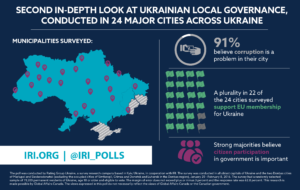
International Republican Institute
Continued military assistance is vital to holding the line against Russia in eastern Ukraine, as is robust diplomatic support from the U.S. and the fiscal discipline requirements introduced by the International Monetary Fund, adds Peter J. Roskam, who served in the US Congress from 2007-2019 and was the chairman of the U.S. House Democracy Partnership. Practical advice and assistance on the mechanics of building a strong democracy are also vital to helping Ukraine, as carried out by bodies including the U.S. House Democracy Partnership, the National Endowment for Democracy, the U.S. Agency for International Development, the International Republican Institute, and the National Democratic Institute, he writes for The Washington Examiner.
Assembling the right team will be crucial for the neophyte president, said Ukrainian political expert Mykola Davydyuk. “The main challenge for Zelenskiy is neither the army nor the war with Russia,” he said. “It is putting together a team: who will be his chief of staff, his deputies, who will fill the key positions.”
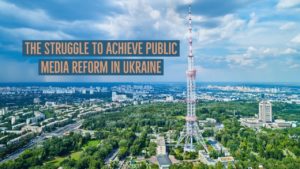 Just 9% of Ukrainians have confidence in their national government, the lowest of any electorate in the world, according to a Gallup poll published in March, Reuters adds.
Just 9% of Ukrainians have confidence in their national government, the lowest of any electorate in the world, according to a Gallup poll published in March, Reuters adds.
“I think the top election issue is frustration with the status quo,” said Mary O’Hagan, Ukraine Resident Senior Director of the National Democratic Institute (NDI).
“Yesterday was about choices and differences; we hope today will be about uniting the nation for a stronger Ukraine,” said former U.S. Ambassador to Ukraine William Taylor (below, center), who co-led the NDI delegation. “With two credible elections inside a month, Ukrainians have reaffirmed their path toward a European future. This election was a remarkable accomplishment in a region where peaceful change at the ballot box is rare. Ukrainians changed leadership in 2004, 2014 and yesterday in 2019. In the first two, Ukrainians went to the public squares around the country; yesterday they went to the ballot boxes.”
All this is bad news for Putin, said CEPA’s Edward Lucas. His dream of civilizational and ecclesiastical hegemony encompassing a putative Russian-speaking, Orthodox world is in ruins. So too is his propaganda narrative. Ukraine, supposedly in the grip of Nazis, will be the only country in the world apart from Israel where both the president and the prime minister are Jewish.
Anti-Semitism has not been extirpated in Ukraine. Far from it, Haaretz’s Anshel Pfeffer writes. But it is now the only country in the world, other than Israel, with both a Jewish prime minister (Volodymyr Groysman) and a Jewish president. In voting for them, Ukrainians — who are extremely conscious of Groysman and Zelensky’s Jewishness — were also making a statement about their country.
 Given the country’s history of anti-Semitism, the fact that such a powerful majority of Ukrainians voted for a Jewish candidate shows right-wing views are out on the fringe, notes analyst Anna Nemtsova:
Given the country’s history of anti-Semitism, the fact that such a powerful majority of Ukrainians voted for a Jewish candidate shows right-wing views are out on the fringe, notes analyst Anna Nemtsova:
A former U.S. ambassador to Ukraine, William Taylor, found it interesting Zelenskiy’s Jewish heritage and preference for speaking Russian (another black mark for Ukraine’s nationalist right) has played such a minor role in the campaign.
“Ukraine has always been accused of being anti-Semitic and nationalistic in regard to the Ukrainian language and Russian language, and here is a guy who is Jewish, speaks Russian and he comes in first, so far,” Taylor, executive vice president of United States Institute of Peace, told The Daily Beast.
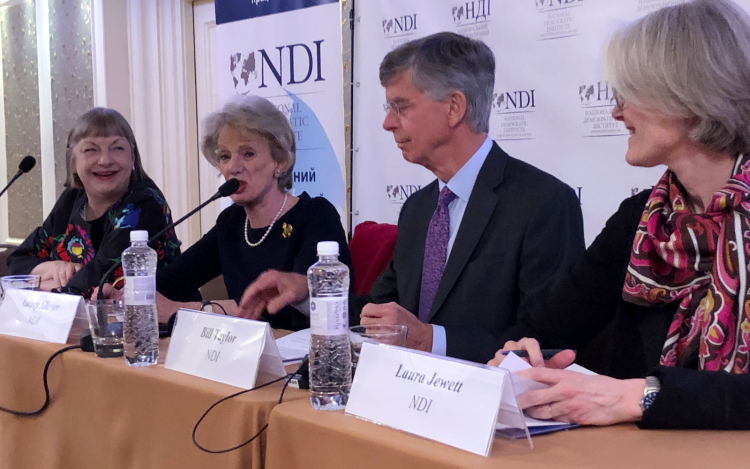
NDI







